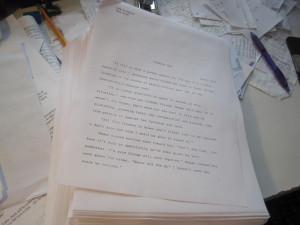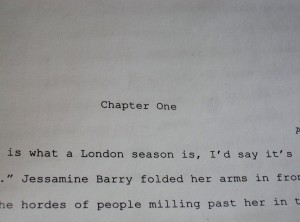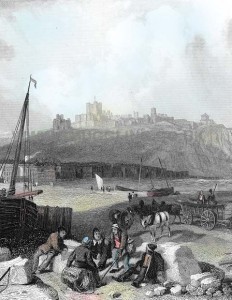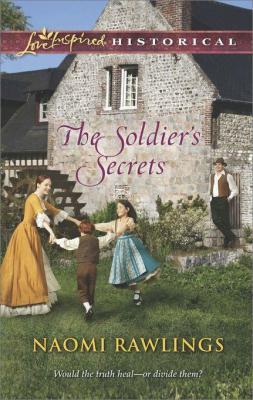Vanessa Riley's Blog, page 74
October 13, 2024
Austen’s World Wrap Up. December 17, 2015
Looks What’s Brewing in the Regency
A Look Back: Pride and Prejudice 2005 and Clueless 1995I’d like to share my thoughts on two Jane Austen movies before the end of the year: Pride and Prejudice, 2005 and Clueless, 1995. Pride and Prejudice 2005 premiered in November ten years ago in the U.S.. I recall watching the film with two members of our Jane Austen book club. The three of us […]
Digest powered by RSS Digest
Originally posted 2015-12-17 06:20:09.
The post Austen’s World Wrap Up. December 17, 2015 first appeared on Vanessa Riley's Regency Reflections.
The Belles’ Holiday Wassailing Tour: Course #5
Vanessa here,
Welcome to this 5th stop on the Wassailing Tour. If you’ve missed some of the others, please don’t hesitate visiting. Here are links to all of the Belles’ holiday wassailing stops, with different Regency era Christmas carols, dinner selections, beverages including wassail recipes at every blog hop.
4 Dec: Jude Knight: The First Course, Regency White Soup7 Dec: Nicole Zoltack: The Second Course, Lobster au Gratin9 Dec: Amy Rose Bennet: The Third Course.11 Dec: Susana Ellis: The Fourth Course, A Yorkshire Pie14 Dec: Vanessa Riley: The Fifth Course, English Bread16 Dec: Caroline Warfield: The Sixth Course, Jerusalem Artichoke a la Crème18 Dec: Sherry Ewing: The Seventh Course, Mince Pies21 Dec: Mariana Gabrielle: The Eighth Course, Christmas PuddingBonus Question for Belles’ Give Away: Which member of Lady Pendleton’s family suggested they sing “I Saw Three Ships.”
The Belles’ Holiday Wassailing Tour: Course #5
Dec 14
Welcome to the 5th stop of the
Belles’ Holiday Wassailing Tour!
14th of December, 1819 Port Elizabeth Colony, South Africa
Precious Jewell swatted her brow as she stirred the huge pot of wassail swinging upon the hearth. It smelled better than it looked with the flecks of cinnamon swimming in the murky brown liquid. Anything had to be better than the ginger beer Gareth brewed at the blacksmith’s. The two were going to lug it here for tonight’s dinner which would be serve to all of the Margeaux’s crew.
Christmas in Charleston or London was cold, double shawl, stiff britches cold. This was so different. Most of the men Gareth captained were as new to this place as she. Would they like the spending the Yuletide here?
Stirring again, she shook her head. Men and beer. The crew would enjoy themselves.
Gareth’s Ginger Beer (Martha Lloyd’s Ginger Beer Recipe)
Two gallons of water,two oz. Cream of Tartar. Ttwo lbs of lump sugar. Ttwo lemons sliced,2 oz. of ginger bruised.Pour the water boiling on the ingredients, then add two spoonfuls of good yeast; when cold bottle it in stone bottles, tie down the corks. It is fit to drink in 48 hours– a little more sugar is an improvement; glass bottles would not do.
Recipe from: Martha Lloyd’s Household Book With thanks to the Jane Austen Society.
Precious’s Wassail – Best Ever Hot Wassail Recipe
Recipe by: Jen Nikolaus
8 cups apple cider2 cups orange juice½ cup lemon juice4 whole cinnamon sticks12 whole cloves, or 1 teaspoon ground cloves¼ teaspoon ground ginger¼ teaspoon ground nutmegCombine all ingredients in a large pan. Bring to simmer over medium-low heat. Reduce heat and continue simmering for 45 minutes. Ladle into cups or mugs and enjoy!
With a final stir, Precious wiped her damp hands with her apron. Her gaze went to the window. The bright green grass and distant palm trees and no snow didn’t quite look like Yuletide either. Well, this is what Gareth wanted and truthfully, she do anything to help him. How could love be so much, so overwhelming, so covering and smoothing all the scarred places.
“Precious, how are things in here?”
Speak of the devil. Gareth, and that deep voice of his, dared to enter her kitchen again. The second time in twenty minutes. Weren’t there some Xhosa to go chase, or something?
She turned to him, waving her big wooden spoon. “Things are as good as the last time you dragged in here. You’re probably ready to spout some more nonsense about English vittles.”
Folding his arms against his brilliant white shirt, he leaned against the door frame. “You sound a little perturbed, my dear. Are you sure nothing is amiss?”
“Nothing. Now go on.” She waved her hand to shoe him like chickens, but that dumb old rooster came forward.
Close to her side, he flashed that pompous, wonderful heart-in-her throat grin. “You seem a little on edge.”
Lowering her spoon, she released a sigh and turned back to her pot. “I know how to cook, you know. You’ve been eating well haven’t you? Don’t have to keep checking up on me.”
He stood directly behind her now, and lightly fingered her neck and gave a rub to her sore shoulders. “You do many things well, my jewel. But this is an English meal, and my men are looking forward to it. It’s a touch of home for them.”
“Do you miss London, Gareth?” Her pulse stopped moving. She could hear every creak of floorboards of the sailors gathering in their parlor. If he missed London, maybe he didn’t like it here, or maybe he had regrets. She stiffened and edged away. Tossing the spoon into her apron pocket, she picked up her oven paddle and went to the fiery brick oven. Sticking it into the hot box, she stabbed at her loaf pan and removed it. “Is that why you keep checking, so you can tell me you want to return?”
He followed and took the paddle and set the steaming loaf on to the table. “You’ve done well with the English Bread. The men will enjoy it, and the rest of meal. Collards and whatever else you’ve created. You’re food is always delicious.”
English Bread
Recipe from The New London Family Cook; Or, Town and Country Housekeeper’s Guide, by Duncan MacDonald
Put a bushel of good flour into one end of your trough, and make a hole in the middle. Take nine quarts of warm water by the bakers called liquor, and mix it with a quart of good yeast; put it to the flour, and stir it well with your hands till it is tough. Let it lie till it rises as high as it will, which will be in about an hour and twenty minutes. Watch it when it comes to its height, and do not let it fall. Then make up your dough with eight quarts more of warm liquor, and one pound of salt: work it up with your hands, and rover it with a course cloth or sack. Put your fire into the oven, and by the time it is heated, the dough will be ready. Make your loaves about five pounds each, sweep your oven clean out, put in your loaves, shut it up close, and two hours and a half will bake them. In summer time your liquor must be lukewarm; in winter, a little warmer, and in hard frosty weather as hot as you can bear your hand in it, but not hot enough to scald the yeast, for should that be the case, the whole batch will be spoiled. A larger or smaller quantity may be made in proportion to these rules.
Precious laid a thin cloth over the bread allowing it to cool, but not dry out. “You didn’t answer my question.”
A smile kissed his lips, and he hummed a tune. What was it?
While Shepherds Watched Their Flocks
https://www.youtube.com/watch?v=6b_hp...
Precious plodded back to hearth and started stirring again. The clove and cinnamon smell of the wassail wafted. It stung a little bit upon her weak eyes. And that poor her heart of hers had lodged right against a rib. It was probably the the only thing keeping it from falling out onto her freshly swept floor.
Gareth’s big hand clasped hers, and he spun her to him. “I have Christmas everyday with you and Jonas, but my men don’t. I just want to give them a special day.”
It was Christmas everyday, being loved by the good captain in Port Elizabeth.
Mistletoe, Marriage, and Mayhem: A Bluestocking Belles Collection
In this collection of novellas, the Bluestocking Belles bring you seven runaway Regency brides resisting and romancing their holiday heroes under the mistletoe. Whether scampering away or dashing toward their destinies, avoiding a rogue or chasing after a scoundrel, these ladies and their gentlemen leave miles of mayhem behind them on the slippery road to a happy-ever-after.
***All proceeds benefit the Malala Fund.***
Amazon | Smashwords | Amazon UK | Amazon Australia | Amazon Canada | Barnes & Noble | iTunes | Kobo
Read more about Precious and Gareth in Season One of the Bargain. The first episode is free.
 Season finale, Episode IV is available. http://bit.ly/1REcdnf
Season finale, Episode IV is available. http://bit.ly/1REcdnf
Originally posted 2015-12-14 06:32:46.
The post The Belles’ Holiday Wassailing Tour: Course #5 first appeared on Vanessa Riley's Regency Reflections.
October 12, 2024
More about Flowers
I really enjoyed Laurie Alice’s post on flowers in regency England in springtime. It dovetails well with the post I’ve been thinking about, which is on the meanings and legends of common flowers during both the regency and Victorian eras in Britain.
 Forget-me-nots and white lilacs in spring
Forget-me-nots and white lilacs in springThe forget-me-not, a common flower in regency gardens was called by Coleridge “blue and bright-eyed flower of the brook.” It’s official name “myosotis” actually means the not-so-romantic “mouse ear,” so named because of the shape of its leaves.
A German legend has it that a knight fell into a swift stream while picking the forget-me-not for his lady. He had only time to toss it to her and cry, “Forget-me-not!” before he was swept away. British king Henry IV chose it as one of his emblems, and it was often embroidered on the king’s robes.
It was not until the regency that it became a garden flower.
 Foxglove in a Maine garden
Foxglove in a Maine gardenEver wonder why foxgloves are called by that name? Digitalis, the official name, is not nearly as descriptive. The old English name of foxes-glofa means foxes’ gloves. The fable is that foxes were hunted for their tails, which were considered amulets against the snares of the devil. In order to hang onto their furry brushes, they appealed to the gods for help, who gave them bells to hide in the fields. The bells would sound a warning when hunters were about and become silent when the coast was clear.
All that ducking and dodging the hunters had given the foxes rough paws, so that when they went hunting in the chicken coops, the chickens would squawk when seized by them. This time the fairies gave the foxes gloves to cover their paws with, and these became known as fox gloves.
Digitalis, which the leaves yield, is a recognized heart stimulant, which was used by American Indians before it became known in Europe. It is also a poison, so it was only used externally by Europeans until the 18th century. It then began to be used in the treatment of fevers, insanity and heart disease.
 Red roses in a park in Brooklyn in June
Red roses in a park in Brooklyn in JuneRoses cultivated in Europe before 1800 are usually referred to as “old roses.” Not until 1792 when a rose from China was introduced into Europe did any of them bloom more than once a year. (The only occasional exception was the Damascus). Rose water was used for cooking. Vanilla supplanted it as a flavoring extract in the 17th century. Rose oil, rose water and rose petals continued in British pharmacopoeias but more and more for use in cosmetics. Attar of roses, the essential oil, took 60,000 roses to make one ounce!
One of the earlier spring flowers, the pansy, goes by many names including “Kiss-Me-Quick” and “Johnny-Jump-Up.” The word pansy is derived from the French penser, to think, which is why Ophelia said “Pansies, that’s for thoughts.” Legend had it that to pick one with the dew upon it would cause the death of a loved one. If picked on a fair day, it would rain before night. Pansy juice squeezed on the lids of a sleeper would cause her to fall in love with the first person she saw on awaking, as Titania discovered in “A Midsummer Night’s Dream.”
 A Heart’s Rebellion, London Encounters #2
A Heart’s Rebellion, London Encounters #2The hero of my upcoming regency, A Heart’s Rebellion, is an amateur botanist, so he will usually refer to a flower by its official name. The system of classifying plants into genus and species was still a new science in the regency era. The heroine’s name, Jessamine, is a form of jasmine, which the hero is fond of calling by its official name, Gelsemium sempervirens.
Bibliography: Flower Fables by Geraldine E. Nicholson, Mid-America Publishing Corp., Kansas City, Missouri
Originally posted 2015-12-13 18:13:45.
The post More about Flowers first appeared on Vanessa Riley's Regency Reflections.
Austen’s World Wrap Up. December 12, 2015
Looks What’s Brewing in the Regency
Risky Regencies: Christmas Rant and Some MusicLong time visitors to the Riskies know I have a complicated relationship with Christmas. I detest the whole commercial aspect and I also despise the idea that the season magically fixes things. However, I embrace the season in my own … Continue reading →Jane Austen’s World: Cooking with AustenJASNA’s Schedule
Digest powered by RSS Digest
Originally posted 2015-12-12 06:20:29.
The post Austen’s World Wrap Up. December 12, 2015 first appeared on Vanessa Riley's Regency Reflections.
October 11, 2024
Jane Austen’s World
Looks What’s Brewing in the Regency
Christmas Rant and Some MusicLong time visitors to the Riskies know I have a complicated relationship with Christmas. I detest the whole commercial aspect and I also despise the idea that the season magically fixes things. However, I embrace the season in my own … Continue reading →Digest powered by RSS Digest
Originally posted 2015-12-11 22:10:43.
The post Jane Austen’s World first appeared on Vanessa Riley's Regency Reflections.
A Heart’s Rebellion Wrap Up
 Thanks to everyone for stopping by our release celebration for A Heart’s Rebellion by Ruth Axtell. We have winners! And answers! And more information about the next book we’re promoting during our Spring Release Extravaganza!
Thanks to everyone for stopping by our release celebration for A Heart’s Rebellion by Ruth Axtell. We have winners! And answers! And more information about the next book we’re promoting during our Spring Release Extravaganza!
The two winners of A Heart’s Rebellion are Collette C. and Kay M! Congratulations to both of you ladies.
If you’re wondering about the answers to our questions the answer to our first week’s question is:
1. In regency times, being the firstborn male was everything in terms of inheritance. What career avenues were open for younger sons?
Answer: Church and Military
2. What is a famous botanical garden in London, which existed in regency times (which is where Lancelot takes Jessamine)?
Thanks to everyone who stopped by so far during our Spring Release Extravaganza, and remember to stop by tomorrow, when you’ll learn about The Soldier’s Secrets by Naomi Rawlings plus have a chance to win more prizes.
Originally posted 2015-12-06 18:06:08.
The post A Heart’s Rebellion Wrap Up first appeared on Vanessa Riley's Regency Reflections.
October 10, 2024
Finishing the Book
 Writing Weather
Writing WeatherAn author’s greatest joy (besides coming up with a strong idea for a story) is finishing the book. It may take only weeks or it may take months (or years!) but there is nothing so satisfying as coming to the conclusion of that first draft of a manuscript.
I have just finished a manuscript for a regency novel which will be published sometime in 2014. It’s a sequel to the first regency I’ve written in a while, Moonlight Masquerade, which will be published by Revell Books in March.
 My Baby with all its rough edges
My Baby with all its rough edges
This story, tentatively titled Duke by Default, took me to late spring and early summer 1815, right before the final battle of the Napoleonic Wars—Waterloo. The battle looms at the edges of my story. But mainly my story concerns the season in London, a bit of botanical gardens, and lost love and new found love.
 Every writing journey begins with Chapter One…
Every writing journey begins with Chapter One…After the initial euphoria of THE STORY IDEA the hard work of getting it written begins. Then comes the next phase, which I will shortly be undertaking: reading through that rough, ill-shapen, wordy thing called a first draft and making it into a diamond of the first water, to borrow some Regency parlance. This stage involves rewriting and reworking, checking up on all kinds of facts that I just skipped over in the first draft, deciding on names for a lot of the secondary characters which I left as blanks in the first stage.
 And ends with The End.
And ends with The End.In a month’s time, hopefully this first draft will have transformed into a wonderful love story which will keep my reader on the edge of her seat, emotionally connected to my hero and heroine, and giving a deep sigh of satisfaction when reaching The End at the last page.
Originally posted 2015-11-29 18:03:00.
The post Finishing the Book first appeared on Vanessa Riley's Regency Reflections.
A Suitable Match, Serial Story Section 2 and a Chance to Win
 This is from 2013: Catch this great serial story. To kick off our second year of celebrating Inspirational Regency fiction, we are presenting the serial story, A Suitable Match. At the end of the month we’ll be giving away a fabulous prize package filled with items tied to the story. For a chance to win, find the item mentioned in this section and leave a note in the comments. Details and a list of prizes can be found here.
This is from 2013: Catch this great serial story. To kick off our second year of celebrating Inspirational Regency fiction, we are presenting the serial story, A Suitable Match. At the end of the month we’ll be giving away a fabulous prize package filled with items tied to the story. For a chance to win, find the item mentioned in this section and leave a note in the comments. Details and a list of prizes can be found here.
Missed an earlier section? Read it here: 1
On the road between Somerset and London
April 1818
Dropping his clenched fists to his breeches, Miles, Earl of Twiford allowed a portion of his anger to subside. The earl stood there half-blinking at the sea nymph emerging from the overturned carriage, her wild ringlets falling about her sleek neck and shoulders.
Twiford shook his head. “Miss Blackstone? Yes, it is you.” He could feel a smile tugging at his lips. More of his fury leeched away. To think he was in high-dudgeon over the near harm to his favourite Arabian team that he’d momentarily overlooked the fact that there might be passengers within the coach requiring assistance.
Yet, as he gazed upon her again something pricked his heart. Wasn’t it ironic to bemoan the loss of a perfectly matched pair: horses, people. He wiped the dust from his chocolate-kid gloves. “Are you injured?”
Her pert mouth clamped shut as if trying to contain one of her tart rebukes. She waved an overly perfumed hand his way.
Pushing aside his manservant, Twiford lifted the creature from the carriage, her slim waist fitting nicely within his grasp. He set her to her feet but not without another blast of violet scent taming the remaining heat of his nostrils.
“Knighting!” She pointed back to the carriage. “You must get my maid out of there.”
With a nod to Drake, his servant of ten years, Twiford set her request in motion. “Where are you headed in such haste? Your noddy driver recklessly cut in front of my party. I suppose he deserved to get the worst of it, but he could’ve gotten you killed.”
“My cou… my driver? Where is he?” She spun away. The hem of her muslin skirts lapped deeper in the river mud. As she marched toward the front of her vehicle, her heart-shaped face drained of all colour. Her gaze descended upon the cresting waters. “Is he…?”
Twiford strode near and almost put his hand on her shoulder. What was it about her that made him vacillate from wanting to throttle Miss Blackstone to tracing the high arch of her neck?
She turned to him with chestnut eyes flashing. “What has been done to him?” She released a shaky breath, then leveled her shoulders. “As you remember, I am not weak or helpless. Spare no truth from me.”
Twiford shifted his stance. How well he did remember. She was a lady with a character more worthy than many of his ilk. “Your driver is in my last carriage. There’s a large, well- deserved bump on his skull, but he’ll live.”
The lady swiveled and headed to his vehicle.
Before he cut in front of her or even opened the vehicle for her, Miss Blackstone thrust open the dusty door. She gasped at the miserable sight, her bloody coachman lying prostrate on the leather seat.
This time Twiford grasped her shoulders to steady her. “He just needs to be cleaned up a bit. The injury looks far worse than what it is. How a man could nod asleep on such treacherous roads is beyond my comprehension.”
Jerking away, she leaned inside and mopped the driver’s brow with a crumpled handkerchief she’d tugged from her pocket.
“Miss Blackstone, he’ll be seen to at our next stop. The George and Pelican is very near. I prom–”
A thin woman pushed past and fell at Miss Blackstone’s feet. “I’ve got your jewels, ma’am. Nothing will be missing from this part of your inheritance. But how will we make your London appointments now? We can’t miss–”
“Knighting.” With a stern look, Miss Blackstone silenced her maid. “I’ll find a way. Blackstones always find away.”
Inheritance? The miss was heading to London? A bad feeling drummed at the pit of Twiford’s stomach. He cleared his throat. “Ladies, let me be of assistance. I am stopping the night at the George and Pelican.”
Miss Blackstone squinted at him as if she looked into a mirror, then fingered her sun-kissed tresses. “Oh, my.” Gripping bundles of her errant locks, she tamed the wild chignon. “Why are you being so helpful, my lord?”
“We can have your driver seen to at the inn to which I shall drive you,” he added.
With another quick jab of a heavy pearl pin, Miss Blackstone secured the last of her curls then stood tall. The misguided airs of a duchess cloaked about her, and the lass seemed to look through him.
“We have never been friends, my lord. Why start now?”
He toyed with the edges of his withered cravat. His sins toward her and her father mounted high. Maybe too high. Twiford swallowed his guilt and took a step toward her. Providence had a new claim to his heart. It was time to start acting upon His leading. “Miss Blackstone, it is my duty to escort you, since I’m a party to this accident, too. Perhaps the opulence of my barouche blinded your driver and caused him to lose control.”
She folded her arms. Her noble chin lifted as her countenance shifted to the maid gathering an errant garnet cloak. “Your wit is still with you, Lord Twiford.”
“Yes, as is my sense of duty.”
“Duty? Yes, you were always about duty, but I thought that was only in service to a friend.”
Perhaps frightened by Miss Blackstone’s searing tone, the Knighting woman slipped back toward the toppled vehicle with an armful of papers and muslin.
Well, he’d earned every accusatory note in the lady’s address, but this day would be different. A small token to salve the old wounds. “Madam, I must insist you allow me to escort you to the George and Pelican.”
“I suppose I do not wish to be benighted on the road. Get our things, Knighting.” Miss Blackstone marched back to her toppled gig and ran her hand along the broken ribs of the roofing. “Lord Twiford will see us to the next stop.”
“Yes, ma’am.” The maid headed to the brush scooping up unmentionables.
“My man will help. Drake, pack their things on the second carriage. Miss Knighting and Miss Blackstone will ride with me.”
“Yes, my lord.” Drake, his most loyal advocate, shook his head then followed the maid plucking possessions littering the road.
Alone with the feisty sea nymph, smelling of his favorite flower, Twiford extended his arm.
She pried away from the wreckage and put her fingers to his sleeve. Her hold was light as if it proved painful to touch him. “Escort us only to the nearest inn. I will not impose upon you any more than necessary.”
“Must you always be so willful? Can you not accept that years can change a person?”
“Forgive me.” She brushed at the specks of mud on her skirt. The scent of violets washed over him with each strike. “But I seem to remember a few choice lectures from you, my lord, about birthright, and station.”
“Well, fools know words, too.” He laid his palm atop hers. “Let me see you all the way to London. After witnessing how well your man drives, it will ease my mind to know you are safe and well in the city.”
***
This was too cruel. Cressida had hoped for a chance meeting with Lord Twiford in a fashionable drawing room at one of the Season’s soirées. As the tall, broad shouldered man handed her into his carriage, she resisted the urge to swat more mud from the skirt of her old, three-seasons-past gown. Where was a hole to hide in when one needed it?
“Miss Blackstone, are you well? You’ve a worried crease on your pretty forehead.” Lord Twiford plucked off his fine leather gloves as he reclined on the opposing bench.
“I am well.” An odd shiver coursed her spine. Twiford was as opposing and menacing as she remembered, a large raven-haired man with an assessing stare.
She licked her dry lips. “Please do not be overly concerned.” Her limbs ached. Her head pounded. Her pride surely was trampled on the floorboards. She slumped into the seat back.
Knighting leaned into her. “Such a fine carriage, Miss Blackstone. It will be a very comfortable ride.”
“Shh.” Cressida kept her voice low, but Twiford never missed anything. He was always in Chard’s confidence pointing out her flaws. She wrung her hands, then forced them to be stilled in her lap. Oh, why couldn’t he have happened upon her wearing one of Madame Touse’s new walking dresses or after Cressida’s change in circumstances had been circulated? Then maybe those wide sky-blue eyes wouldn’t be viewing her with such speculation.
She lowered her lashes, blurring Twiford’s image with the weave pattern in the Padua silk lining the walls. “My lord, thank you … for your assistance.” A yawn escaped of its own volition. “But I’m sure you’ll be glad to be rid of us.”
“On the contrary, it’s good to have company on these long treks from the country. No one usually wants to go set up the Grosvenor townhouse, just enjoy its offerings. Hopefully, my mother and sister will stay long enough to bring it around. They left ahead of me and are already at the townhouse.”
****
The carriage swayed to a stop. Cressida stretched her arms and gazed out at the well-lit inn. Pivoting to the smiling lord, she sat up straight.
Lord Twiford rolled his shoulders, then tugged on his felt top hat. His grin shone in the dim carriage light. He lifted his hand to her. “Come along. Once I’ve had an apothecary see to your coachman. I could expect you to have some charity and dine with me, along with your maid for chaperone, of course, my dear.”
* Section 2 was written by Vanessa Riley, www.christianregency.com *
Did you find the hidden item? Note it in the comments below for a chance to win.
Don’t forget that the readers will ultimately choose who truly loves Cressida, and whom she loves in return. Already have a favorite? Go vote for him! Want everyone else to vote for him too? Grab a voting badge from the Suitable Match Extras page.
What surprises do you think await Cressida at the inn? Read the next installment!
THE CONTEST AND POLL ARE NOW CLOSED. Feel free to continue to enjoy and share the story.Originally posted 2015-11-22 17:45:39.
The post A Suitable Match, Serial Story Section 2 and a Chance to Win first appeared on Vanessa Riley's Regency Reflections.
October 9, 2024
Retro Read: The Country Gentleman by Fiona Hill
 Ann Guilfoyleis a wealthy and independent young woman in Regency England, with her life planned before her. She opens her drawing room to what she considers the creme de la creme of thinking people and she intends to marry the exact right man. Then financial tragedy strikes and she finds herself 200 miles from London trying to settle herself into country life, a fate worse than death for a woman who considers herself sophisticated and intellectual. She thinks she can only mock thegentleman farmer Mr. Highet and his “gargantuan” mother. In short, Ann is a snob who thinks this country gentleman beneath her, yet when a different tragedy strikes, this one of the heart, she accepts his offer of help and her attitudes and heart begin to change.This is not a story full of suspenseful, page-turning moments. The pace is almost as leisurely as the country life about which Hill writes. Yet the way in which Ann grows as a woman is so heart-warming, along with the love story, I have always listed this book among of my top fifty Regencies and worth the reread from time to time.You will likely only find this sbook in llibraries or used bookstores. I’ve seen it for as little as $.01, which is a pity, and it is a quarter of a century old, definitely among the clean, sweet traditional Regencies of old, with an author who is a master character-driven storyteller.
Ann Guilfoyleis a wealthy and independent young woman in Regency England, with her life planned before her. She opens her drawing room to what she considers the creme de la creme of thinking people and she intends to marry the exact right man. Then financial tragedy strikes and she finds herself 200 miles from London trying to settle herself into country life, a fate worse than death for a woman who considers herself sophisticated and intellectual. She thinks she can only mock thegentleman farmer Mr. Highet and his “gargantuan” mother. In short, Ann is a snob who thinks this country gentleman beneath her, yet when a different tragedy strikes, this one of the heart, she accepts his offer of help and her attitudes and heart begin to change.This is not a story full of suspenseful, page-turning moments. The pace is almost as leisurely as the country life about which Hill writes. Yet the way in which Ann grows as a woman is so heart-warming, along with the love story, I have always listed this book among of my top fifty Regencies and worth the reread from time to time.You will likely only find this sbook in llibraries or used bookstores. I’ve seen it for as little as $.01, which is a pity, and it is a quarter of a century old, definitely among the clean, sweet traditional Regencies of old, with an author who is a master character-driven storyteller.Originally posted 2015-11-15 17:30:05.
The post Retro Read: The Country Gentleman by Fiona Hill first appeared on Vanessa Riley's Regency Reflections.
Smuggling in Regency England
Naomi here. We’ve talked quite a bit this month about taxes and money, both current and Regency related. But one thing we haven’t looked at was how the people of Regency England felt about those taxes, and even more importantly, how the people thwarted those taxes.
Isn’t it rather interesting to know that people have been evading taxes for hundreds of years? The concept is hardly new, though the methods and means have changed through the centuries.
So, now you’re asking, how did the English population avoid all those hefty taxes? Well, not all of them could be avoided (here’s a little list of some of the more odd Regency taxes). But duties or import taxes could be easily avoided through:
Smuggling.
That’s right. Smuggling, that dastardly century-old business. England being an island and therefore surrounded by water, imported and exported all its taxable goods via shipping. There are lots of places along the English coast where sailing vessels could harbor and unload their goods away from the watchful eye of the revenue agents.
Anything that was taxed–which was pretty close to every purchasable good imaginable. Tea and brandy were two of the biggest items, but that list would also include salt, leather, soap, chocolate, fabric, and cigars.
Furthermore, during the French Revolutionary Wars and Napoleonic Wars, French imports were banned from England. And France made things craved by the British upper class, like silk from Lyons and lace from cities such as Alencon and Arras and Dieppe and Le Puy.
And of course brandy.
If there’s one constant in smuggling throughout the annals of history, it’s this: smugglers always deal with spirits.
Where were the goods smuggled?
Though the whole of the English coast was subject to smuggling, smuggling occurred in greatest concentration along the English Channel. A quick little jaunt to France and back allowed for smuggling en masse in this region. The County of Kent, which lies nearest France and at it’s easternmost point is separated only by a few miles of water, was a smuggling hotbed. In the 1780s, the English government burned all the sailing vessels in the town of Deal, located just north of Dover, claiming there wasn’t a single sea-worthy vessel in the harbor that didn’t engage in smuggling.
Once on land, tea and brandy and cigars and the like easily made their way to the markets in London, and the overland smuggling was so elaborate that the English people had no way of knowing whether the tea they purchased had been smuggled in. In fact, some estimate that 75% of the tea in England was smuggled in during the eighteenth and nineteenth centuries.
 How did the smugglers operate?
How did the smugglers operate?
Answering this question gets fun and creative and more than a little interesting. The British government did try to prevent smuggling, but keep in mind, the crown needed sailing vessels (most commonly cutters) and sea-worthy men to do this. And while fighting wars with America and France, the crown didn’t exactly have the personnel and vessels to shut down smuggling operations. In fact, it’s often said that the sailors on the kings cutters were people unfit for naval service. There are all kinds of stories of sailors sleeping on duty, and being hired despite old age and missing limbs and a host of other ailments that would make fighting off quick, able-bodied smugglers rather impossible.
The crown did have a preventative service in place, with enough revenue agents that smugglers couldn’t bring a large vessel directly into a harbor and unload illegal goods in broad daylight. Smuggling vessels were often painted black with black sails, making them invisible in the night. Often times smuggling cutters and sloops would drop barrels of brandy into the channel just off the shore, and then “fishermen” would take their smaller crafts out to retrieve the brandy and send it off to London. Sometimes these smuggling cutters would have a rendezvous time and place set up, and the smaller vessels would come and unload the cutter, then return to port under the guise of fishing.
In some towns along the coast, such as Hastings and Dover and the smaller towns in between, the smugglers almost acted like a modern day gang. The smugglers looked out for one another and engaged in illegal activities with each other. Even if the law abiding citizens of the town knew of the smugglers, they’d never turn the smugglers in for fear that their houses would be burned and their families killed.
And yes, sadly, such things did happen.
In other instances, there are stories of smugglers acting out of line and hurting a good, upstanding citizen, after which, the inhabitants of the local village got mad at the injustice and called down the law.
All in all, the topic of smuggling is much too involved to delve into with a single blog post. If you’re interested in further reading on this topic, you could try King’s Cutters and Smugglers: 1700-1855 by E. Keble Chatterton. (The ebook is free.) Or Smuggling in the British Isles by Richard Platt. Platt has a great smuggling website with a lot of information as well.
And you might be interested to know, I’m going to have a rather nefarious French smuggler and his gang play a major role in the sequel to Sanctuary for a Lady. Oh the fun we writers get to have as we explore the dastardly deeds of ages past!
Originally posted 2015-11-08 17:23:09.
The post Smuggling in Regency England first appeared on Vanessa Riley's Regency Reflections.








